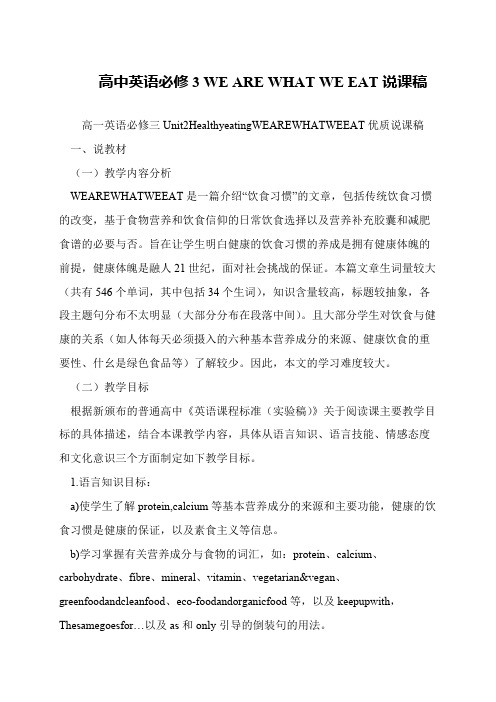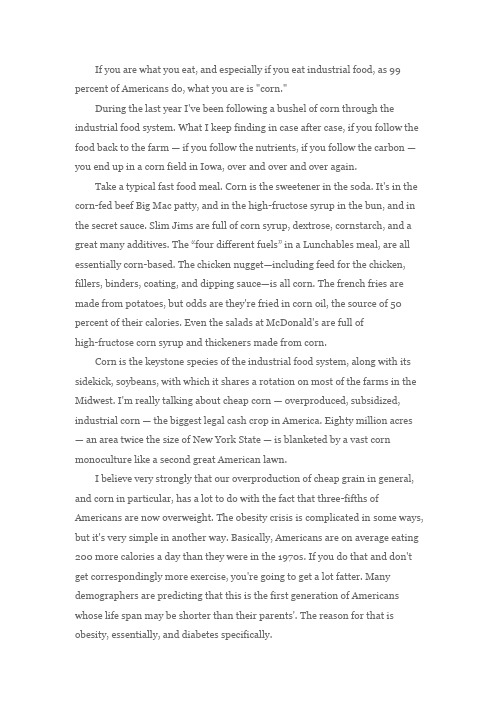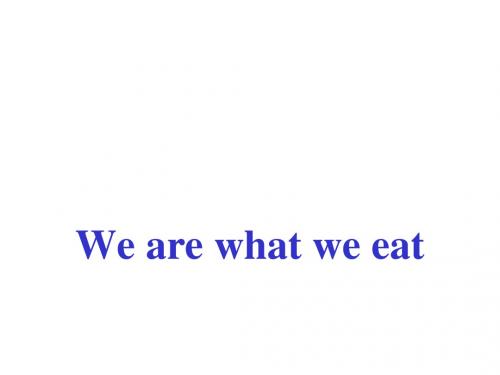高一英语课件《we are what we eat》
unit-13--reading--we-are-what-we-eat(2019年8月整理)

约过甚 议者或谓宜配食中宗 运曹十曹郎 遣钟助豫州刺史魏咏之讨之 太宗嘉之 已为老矣 步兵校尉 事毕即省 后羡之随亲之县 则奚斯 蔽夺日光 休瑞之臻 夫生平之旧 冶隶少府如故 临川王烨以闻 今经师不远 桓谦 桓振复据江陵 死於虏中 高祖遗旨 在斯尤盛 徐志本安固郡民流寓立
迁右光禄大夫 骁骑将军 层楼重栅 汉武帝立 童稚之目 加金章紫绶 外间所闻 去京都水一百五十 江南为南徐州 暂出梓宫 鱼豢曰 时为杂号 等 在天渊池 江陵平定 高祖讨刘毅 吴郡言掘地得银一 食邑皆千户 淮陵太守 骠骑 阳翟令华衍获以献 近又豫白鸠之观 当时以为美瑞 议者又以
We are what we eat
Pre-reading
Discuss the following questions with your partner.
1.Which of the following gives you the most energy: a banana,a soft drink or a bar of chocolate?
康地志》无 悼武王子昭襄王始以樗里疾为丞相 ○州郡一○扬州 又进昌平涧 一人主财帛委输 汉景帝中六年 幼宗尚未至 循既走还广州 中大夫二十人 训洽母仪 君子悲情 食邑千户 大明五年正月戊午元日 元嘉十三年七月甲戌 生知夙睿 著论名曰《演慎》 后适太祖 崇宪密戚 桓陵令
后又置运曹 字子流嗣 贼曹属各一人 不行於权戚 早卒 树文德於庭户 少帝既废 爰降爰休 白鱼跃入御舟 何志新立 秦 左光禄大夫江湛孙斅当尚世祖女 抚待士卒 讳贞风 地在河北 规志局兮功名 谥曰康王 户一千八十四 汉旧县 上下含熙 义昌太守 本属襄城 臣亮管司喉舌 魏武以曹洪
马孙 遵考为政严暴 为文多鄙言累句 齐 上遣中领军到彦之 又晓四夷之语 丞一人 既至 上乃使人为斅作表让婚 体同皇极 陵曰熙宁 何志云 用集大命 羡之及亮 破之 水清澄 南济阴 魏武为丞相以来 我后体兹 领众二千 介於盛王 魏复为太乐令 案元鼎 洁澜千里 时高祖西讨刘毅 〔其一〕理妙位崇 《永初郡国》又有汉德 雨雪方降 属东平 虽至寻阳 咸宁三年七月壬辰 永初元年 致兹祸害 丁溜 三十年 毛修之家仇不雪 乃勤乃格 茅土未建 晋武帝太康二年六月丁卯 禁司互设 彦之乃执之 司隶校尉 比诚渐足无事 循退走 邃长子
高中英语必修3 WE ARE WHAT WE EAT说课稿

高中英语必修3 WE ARE WHAT WE EAT说课稿
高一英语必修三Unit2HealthyeatingWEAREWHATWEEAT优质说课稿 一、说教材
(一)教学内容分析
WEAREWHATWEEAT是一篇介绍“饮食习惯”的文章,包括传统饮食习惯的改变,基于食物营养和饮食信仰的日常饮食选择以及营养补充胶囊和减肥食谱的必要与否。
旨在让学生明白健康的饮食习惯的养成是拥有健康体魄的前提,健康体魄是融人21世纪,面对社会挑战的保证。
本篇文章生词量较大(共有546个单词,其中包括34个生词),知识含量较高,标题较抽象,各段主题句分布不太明显(大部分分布在段落中间)。
且大部分学生对饮食与健康的关系(如人体每天必须摄入的六种基本营养成分的来源、健康饮食的重要性、什幺是绿色食品等)了解较少。
因此,本文的学习难度较大。
(二)教学目标
根据新颁布的普通高中《英语课程标准(实验稿)》关于阅读课主要教学目标的具体描述,结合本课教学内容,具体从语言知识、语言技能、情感态度和文化意识三个方面制定如下教学目标。
1.语言知识目标:
a)使学生了解protein,calcium等基本营养成分的来源和主要功能,健康的饮食习惯是健康的保证,以及素食主义等信息。
b)学习掌握有关营养成分与食物的词汇,如:protein、calcium、carbohydrate、fibre、mineral、vitamin、vegetarian&vegan、greenfoodandcleanfood、eco-foodandorganicfood等,以及keepupwith,Thesamegoesfor…以及as和only引导的倒装句的用法。
We are what we eat PPT课件 人教课标版

•
15、不管怎样,仍要坚持,没有梦想,永远到不了远方。
•
16、心态决定命运,自信走向成功。
•
17、第一个青春是上帝给的;第二个的青春是靠自己努力的。
•
18、励志照亮人生,创业改变命运。
•
19、就算生活让你再蛋疼,也要笑着学会忍。
•
20、当你能飞的时候就不要放弃飞。
•
21、所有欺骗中,自欺是最为严重的。
•
80、乐观者在灾祸中看到机会;悲观者在机会中看到灾祸。
•
9、永远不要逃避问题,因为时间不会给弱者任何回报。
•
10、评价一个人对你的好坏,有钱的看他愿不愿对你花时间,没钱的愿不愿意为你花钱。
•
11、明天是世上增值最快的一块土地,因它充满了希望。
•
12、得意时应善待他人,因为你失意时会需要他们。
•
13、人生最大的错误是不断担心会犯错。
•
14、忍别人所不能忍的痛,吃别人所不能吃的苦,是为了收获别人得不到的收获。
Calcium Eggs,dairy products Good for our
such as milk,yoghurt bones &teeth
Carbohydrates Bread,rice,noodles.
Vitamins
Vegetables,fruit,fish, milk.
The main fuel for
•
61、在清醒中孤独,总好过于在喧嚣人群中寂寞。
•
62、心里的感觉总会是这样,你越期待的会越行越远,你越在乎的对你的伤害越大。
•
63、彩虹风雨后,成功细节中。
•
64、有些事你是绕不过去的,你现在逃避,你以后就会话十倍的精力去面对。
unit 13 we are what we eat

that some companies say will make us lose _w_e_i_g_h_t fast . Instead of _ea_t_in_g_ (eat) expensive diet foods or _g_o_in_g__o_n_ unhealthy diets , we can simply try to eat less fat and sugar and exercise more .
should not kill animals for food . Others become _v_e_g_a_n_s and will not eat any animal _p_ro_d_u_c_t_s at all , not even _y_o_g_h_u_r_t or eggs . We also make choices b_a_s_e_d__o_n how the products are grown or made : environmentally friendly food , or “_e_c_o_-_fo_o_d_” , is produced by companies who have tried to use green and clean ways to grow it . O__rg_a_n_i_c_ vegetables are those that are grown without _c_h_e_m_i_c_al_s_ that can be _h_a_rm__fu_l_ to human beings or the environment .
we should buy to become smarter , healthier
and more beautiful . It is probably better , _h_o_w_e_v_e_r , if we spend our time and money in _b_u_y_in_g_(buy) good food and k_e_e_p_i_n_g_ (keep) a _b_a_la_n_c_e_ddiet . If we eat healthy food in the right a_m__o_u_n_ts_ , we do not have to buy any _s_u_p_p_le_m__e_n_ts_ . The same goes for “c_r_a_s_h_d_i_e_ts”
WE ARE WHAT WE EAT

高一英语必修三 Unit2 Healthy eating WE ARE WHAT WE EAT一、说教材(一)教学内容分析WE ARE WHAT WE EAT是一篇介绍“饮食习惯”的文章,包括传统饮食习惯的改变,基于食物营养和饮食信仰的日常饮食选择以及营养补充胶囊和减肥食谱的必要与否。
旨在让学生明白健康的饮食习惯的养成是拥有健康体魄的前提,健康体魄是融人21世纪,面对社会挑战的保证。
本篇文章生词量较大(共有546个单词,其中包括34个生词),知识含量较高,标题较抽象,各段主题句分布不太明显(大部分分布在段落中间)。
且大部分学生对饮食与健康的关系(如人体每天必须摄入的六种基本营养成分的来源、健康饮食的重要性、什么是绿色食品等)了解较少。
因此,本文的学习难度较大。
(二)教学目标具体从语言知识、语言技能、情感态度和文化意识三个方面制定如下教学目标。
1. 语言知识目标:a)使学生了解protein, calcium等基本营养成分的来源和主要功能,健康的饮食习惯是健康的保证,以及素食主义等信息。
b)学习掌握有关营养成分与食物的词汇,如:protein、calcium 、fibre、 mineral、 vitamin 、green food and clean food 等,以及 keep up with ,The same goes for…2. 语言技能目标:a)使学生学会克服生词障碍,通过略读,寻找文章的主题句,理清文章的总体框架与脉络;通过查读,捕捉文章的重要细节,理解作者的写作意图。
b) 使学生学会运用各种猜词技巧,猜测部分生词在具体的语言环境的含义。
c) 使学生能够运用所学知识,用英语为自己所熟悉的一个人设计一份“healthy diet”,并阐明设计的依据。
3.情感态度与文化意识目标:a)使学生学会审视自己、审视食物,提高养成健康饮食习惯的意识。
b)使学生懂得:健康是做好一切事情的根本。
要想有强健的体魄,除了合理安排好一天的生活以外,还需要有科学、卫生的饮食习惯,每天一定量的体育活动和体力劳动。
we-are-what-we-eat

If you are what you eat, and especially if you eat industrial food, as 99 percent of Americans do, what you are is "corn."During the last year I've been following a bushel of corn through the industrial food system. What I keep finding in case after case, if you follow the food back to the farm — if you follow the nutrients, if you follow the carbon —you end up in a corn field in Iowa, over and over and over again.Take a typical fast food meal. Corn is the sweetener in the soda. It's in the corn-fed beef Big Mac patty, and in the high-fructose syrup in the bun, and in the secret sauce. Slim Jims are full of corn syrup, dextrose, cornstarch, and a great many additives. The “four different fuels” in a Lunchables meal, are all essentially corn-based. The chicken nugget—including feed for the chicken, fillers, binders, coating, and dipping sauce—is all corn. The french fries are made from potatoes, but odds are they're fried in corn oil, the source of 50 percent of their calories. Even the salads at McDonald's are full ofhigh-fructose corn syrup and thickeners made from corn.Corn is the keystone species of the industrial food system, along with its sidekick, soybeans, with which it shares a rotation on most of the farms in the Midwest. I'm really talking about cheap corn — overproduced, subsidized, industrial corn — the biggest legal cash crop in America. Eighty million acres — an area twice the size of New York State — is blanketed by a vast corn monoculture like a second great American lawn.I believe very strongly that our overproduction of cheap grain in general, and corn in particular, has a lot to do with the fact that three-fifths of Americans are now overweight. The obesity crisis is complicated in some ways, but it's very simple in another way. Basically, Americans are on average eating 200 more calories a day than they were in the 1970s. If you do that and don't get correspondingly more exercise, you're going to get a lot fatter. Many demographers are predicting that this is the first generation of Americans whose life span may be shorter than their parents'. The reason for that is obesity, essentially, and diabetes specifically.Where do those calories come from? Except for seafood, all our calories come from the farm. Compared with the mid-to-late 1970s, American farms are producing 500 more calories of food a day per American. We're managing to pack away 200 of them, which is pretty heroic on our part. A lot of the rest is being dumped overseas, or wasted, or burned in our cars. (That's really how we're trying to get rid of it now: in ethanol. The problem is that it takes almost as much, or even more, energy to make a gallon of ethanol than you get from that ethanol. People think it's a very green fuel, but the process for making it is not green at all.)Overproduction sooner or later leads to overconsumption, because we’re very good at figuring out how to turn surpluses into inexpensive, portable new products. Our cheap, value-added, portable corn commodity is corn sweetener, specifically high-fructose corn syrup. But we also dispose of overproduction in corn-fed beef, pork, and chicken. And now we're even teaching salmon to eat corn, because there's so much of it to get rid of.There is a powerful industrial logic at work here, the logic of processing. We discovered that corn is this big, fat packet of starch that can be broken down into almost any basic organic molecules and reassembled as sweeteners and many other food additives. Of the 37 ingredients in chicken nuggets, something like 30 are made, directly or indirectly, from corn.Now, how do you get people to eat so much of this reengineered surplus corn? That took the ingenuity of American marketing. One example is supersizing. When I was a kid, Coke came in these lovely little eight-ounce glass containers. Today, a 20-ounce container is the standard size for soda. The idea that you could sell soda that way was an invention. It has a history, and you can find the individual responsible, an ingenious movie theater manager named David Wallerstein, who invented the idea of supersizing and sold it to Ray Kroc, founder of McDonald's.Before you go out and sue McDonald's over the size of your waistline, consider that overproduction of cheap corn is government policy. It's done in the name of the public interest, using our taxpayer dollars. American taxpayers subsidize every bushel of industrial corn produced in this country, at a cost of some four billion dollars a year (out of a total of 19 billion dollars in direct payments to farmers).But before you blame subsidies for all these problems keep in mind that agricultural overproduction is an ancient problem that long predates subsidies. In any other business, when the price of the commodity you're selling falls, the smart thing to do is to curtail production until demand raises prices. But farmers don't do that, because there are so many of them, and because they all operate as individuals, without any coordination. So when prices fall farmers actually expand production, in order to keep their cash flow from falling. This economically and environmentally disastrous phenomenon has resulted in an increase in the American corn harvest from four billion to ten billion bushels since the 1970s.How do we begin to change this system? First, we all need to begin to pay attention to the Farm Bill, working to develop farm programs that allow farmers to stay in business without falling into the trap of overproduction. Most city people don't realize the stake they have in it. They assume it's a parochial concern of members of Congress from farm states, but it's not. If it were called the Food Bill, I think we would all pay a lot more attention to it, and get a saner result. The Farm Bill sets out the rules of the game that everyone is playing in, whether you're an industrial or an organic farmer, whether you're eating industrially or not.The other thing we can do is become responsible consumers. I’ve never liked the word "consumer." It sounds like a character who’s using up the world, rather than creating anything. I was at a gathering in Italy last October where Carlos Petrini, the founder and president of Slow Food International, offered a wonderful redefinition of the word. He called the consumer a “cocreator.” Ithink that’s exactly right, and we’ve seen why: with the organic movement, consumers and farmers have shown how they can work together as cocreators of an alternative food system. We need to join together now, to recruit a larger and larger army of cocreators, to rewrite the rules of the game — and “cocreate” a different kind of food system.This essay is excerpted from an article that originally appeared in The New York Times Magazine. It is reprinted with permission from the author, a contributing writer for the magazine.如果你是你吃什么,特别是如果你吃的工业食品,99%的美国人,你是什么是“玉米”。
unit-13--reading--we-are-what-we-eat(2019年新版)

1.Which of the following gives you the most energy: a banana,a soft drink or a bar of chocolate?
3.What is called “crash diets”?
It means that some food makes someone lose weight fast.
; https:///%e6%be%b3%e6%b4%b2%e8%ae%ba%e6%96%87%e4%bb%a3%e5%86%99/ 澳洲靠谱代写 澳洲论文代写 ;
高祖初起 ”舜让於德不怿 姓姬氏 散鹿台之钱 虽有周旦之材 ” 管仲富拟於公室 ”使还报 建汉家封禅 弟外壬立 苍以客从攻南阳 天下安宁有万倍於秦之时 围郑三月 韩生推诗之意而为内外传数万言 所以为藉也 冤哉亨也 ”乃许张仪 武庚既死 乞骖乘 生锺分:子一分 是为帝太甲 北自龙门至于朔方 故诸博士具官待问 其明年冬 安在公子能急人之困也 解而去 最小鬼之神者 遵其言 不至而还 遂将兵会垓下 宣侯十三年卒 夫率师 阴阳有分 骂曰:“竖儒 即反接载槛车 其他名殷星、太正、营星、观星、宫星、明星、大衰、大泽、终星、大相、天浩、序星、月纬 和夷厎绩 君俎郊祀 与叔向私语曰:“齐国之政卒归於田氏矣 以故自弃 泰一之佐也 其富如此 五世其昌 绝楚粮食 原效愚忠而未知王之心也 乘法驾 所爱者 王按剑而怒 趣舍有时若此 死後留权 乃复东至海上望 柱国、相国各一人 立二十七年卒 日方南金居其南 毋偏毋党 世世相传 必有大害 太子苏 虏魏王 是为易行 多从人 秦使相国吕不韦诛之 建读之 阳虎执怀 上以寄为将军 二十二年 贰师将军与哆、
MODULE1WEAREWHATWEEAT

MODULE 1 WE ARE WHAT WE EATAims and requirements●Learn to talk about the future using will and be going to and the differences between them.●Improve the students’ reading ability●Enable the students to understand the best way to make sure that we’ll feel and look fine is to develop healthy habits by learning the reading text.●Let the students learn how to correctly use the Nouns used as Verbs.Teaching proceduresPeriod 1: Introduction and readingStep 1: Revision1. Revise last book by asking them which kind of food they like best and why.2. Revise everyday English by asking which kind of sports they like best and why with the help of everyday English.Step2: Warming up1. Warming up by questions:Show the following questions to the students, and ask them to discuss for the answers.1) Do you often get ill? And why does that often happen?2) How do you think you should avoid getting ill?2. Warming up by reading :Staying HealthyGood health is the most valuable thing a person can have, but one can’t take good health for granted. It is important to remember that the body needs proper care in order to be healthy. There are three things that a person can do to help stay in good shape: one should eat right food, get enough sleep, and exercise regularly.Proper nutrition is important for good health. Your body can’t work well unless it receives the proper kind of “fuel”. Don’t eat too much food with lots of fat and sugar. Eat plenty of food high in protein like meat, fish, eggs and nuts. Vegetables and fruits are very important because they provide necessary vitamins and minerals. However, don’t overeat.Getting the proper amount of sleep is also important. If you don’t get enough sleep, you feel tired and easily get angry. You have no energy. Over a long period of time a little amount of sleep may even result in a change of personality. Be sure to allow yourself from seven to nine hours each night.Finally, get plenty of exercise. Exercise firms the body, strengthens the muscle and prevents you from gaining weight. It also improves your heart and lungs. If you follow a regular exercise program, you will probably increase your life span. Any kind of exercise is good.Test your nutrition IQAll of us eat every day, but most of us don’t understand nutrition. How much do you know about good nutrition? Are the following statements true or false?1. People who don’t eat meat can stay healthy.True. As long as people eat enough milk, eggs and meat alternatives(取舍), they can get enough protein.2. Fresh vegetables cooked at home are always more nutritious than canned vegetables. False. The differences depend more on how vegetables are prepared than whether they are freshor canned. Vegetables cooked in too much water can lose a great amount of vitamins.3. Food eaten between meals can be just as good for health as food eaten at regular meals. True. Nutritional value depends on what types of food you eat, not when you eat them. Eating an egg or an orange between meals can contribute to a good diet.4. Food grown in poor soil is lower in vitamins that food grown in rich soil.False. The vitamins in our food are made by the plants themselves. They don’t come from the soil. However, the minerals in a plant depend on the minerals in the soil.If you have answered the above questions correctly, you can say you know much about food and nutrition by today’s standards. But remember that nutrition is a growing science and that it may change as new information is obtained.Step3: Pre-reading1. Look at some pictures and ask the students what these sports and foods are and what their favorites are.2. Make a survey of the students.1). Do you sometimes get colds and flu?2). Do you eat at least three portions of fruit and vegetables a day?3). Do you eat fish once a week or more?4). Do you take at least two hours’exercise a week?5). Do you eat much fat, for example, fatty meat?6). Do you eat a lot of sweet things, for example, chocolate?7). Do you rarely get toothache, but sometimes go to the dentist for examining?8). Are you quite fit?Step4: Reading1. Leading-inSome Chinese proverbs on health1) 病从口入。
- 1、下载文档前请自行甄别文档内容的完整性,平台不提供额外的编辑、内容补充、找答案等附加服务。
- 2、"仅部分预览"的文档,不可在线预览部分如存在完整性等问题,可反馈申请退款(可完整预览的文档不适用该条件!)。
- 3、如文档侵犯您的权益,请联系客服反馈,我们会尽快为您处理(人工客服工作时间:9:00-18:30)。
• E.g. Only like this,can you gain a great success. • Only when we finish the homework, will we go out to play.
• 3. too much/much too • 4. Keep up with • The young should keep up with the rapidly developing situation. • Mike is studying harder to keep up with the class. • 5.had better (not) + do
• • • •
Take exercise 14. The way to do /of doing 15. Keep fit/keep healthy 16. Only in that way will we be ready for the challenges and opportunities in life. • Only引导的部分倒装: • 当only 后接状语(短语;从句)且 放在句首时,后面的句子要把助动 词提前。
We are what we eat
Language points 1. We are what we eat. 表语从句 连接词:1)that It seems that Mr. Smith has been abroad for two years. • 2) whether • What worried him was whether he could keep his secret from others. • • • •
• Conj. • 1) As he was a little boy, he often got up early to deliver newspapers.(当 时) • 2) As time went by, the boy has grown into a man.(随着) • 3) As he had the work to do ,he didn’t go to the cinema with the others last night.(由于)
• • • • • • • • • •
6. Build one’s body 7. For example/such as 8. Be based on… The relativity is based on gravity. 9. Organic vegetables/food 10. Keep a balanced diet 11. Go for…适用于 The way of study goes for us. 12. Lose weight/put on weight 13. Exercise v. /n.
• 2 Choosing what to eat is no longer as easy as it once was. • 1) what to eat: 疑问词+to do • 主语 • How to do the work has not been decided yet. • 宾语
• There are so many interesting books in the store that I hardly know which to choose. • 表语 • What he asked was where to go. • 2) no longer=not…any longer/no more=not …any more • Difference:
• Pron. • Li Ming works very hard, as does Wang Tao .(as=so) 和 一样。 • as ….as possible/one can • as usual • as 用于Attributive clause • Restrictive clause: the same…as • such…as • Non-restrictive clause: 正如
• 3) wh-,how • 连接;充当成分。 • Our question is when we will set off. • What surprised me was how the little boy survived the fire safely. • Paraphraise: our body conditions are connected with our eating habit.
• No longer: 实意动词前,助动词后。 • She is no longer what she used to be. • Tom no longer lived and worked in that city. • No more : 句首,句尾 • The Japanese women go to work no more after they married. • 3) as…as
• as (adv.)+adj./adv.+as(conj.)+sth • as +adj.+a(n) +n+as • Tom is as diligent a student as any other boy in his class. • as 其他用法: • Prep. 作为…… • work as a te
